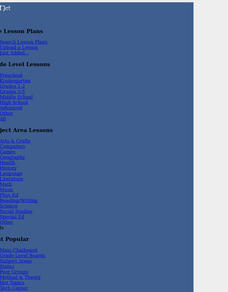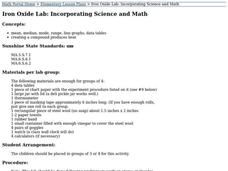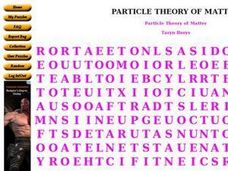Curated OER
Insulators
Sixth graders examine properties of four types of spoons, record observations, and apply their knowledge by designing the perfect hot chocolate cup.
Curated OER
Hot Stuff
Students investigate mechanical and electrical machines in the classroom and school, and identify which produce heat while operating.
Curated OER
Heat on the Move
Students complete a performance event in which they choose a "problem" involving convection, conduction, or radiation to solve. They conduct internet research to help them design their "answer" and write a "mission plan" explaining how...
Curated OER
Breaker Breaker
Students create a model of a circuit breaker to help them explain how friction causes heat, and how current is carried.
Curated OER
The Warmth of the Sun
Pupils broaden their understanding of the sun, particularly its critical role in warming the land, air and water around us.
Curated OER
Heat and electrical resistance (Middle, Science)
Pupils work in teams to create electrical resistance when studying heat and thermal energy.
Curated OER
Iron Oxide Lab: Incorporating Math and Science
Students conduct an experiment in small groups, draw conclusions about the amount heat of a compound achieves and practice their data analysis skills.
Curated OER
E3 Project Instrustional Plan
Students will learn about energy. This physics lesson plan, outlines the energy unit to be taught that covers energy, conversions, and heat.
Curated OER
Thermal Expansion
Students investigate thermal expansion of different substances. In this physics lesson, students explain how heat transfer occurs.
Curated OER
Heat Loss and Gain in Physical Changes and Chemical Reactions
Students compare and contrast exothermic and endothermic reactions. In this chemistry lesson, students perform experiments to determine whether heat was released or absorbed in a reaction. They share their observations in class.
Curated OER
Heating the Earth
Students examine heat rates for dark and light surfaces. In this heat instructional activity students complete a lab activity and plot data.
Curated OER
The Physical Setting
Tenth graders examine chemical reactions. For this chemistry lesson students choose an investigation that they wish to perform based on their interest.
Curated OER
The Science of Weather: Humidity makes air feel even hotter.
Students examine the effects of heat and humidity. In this weather lesson, students read a chart to determine the effects heat and humidity can have on the human body. This lesson includes an optional extension activity using a newspaper.
Curated OER
Imagine Life Without Friction
Students learn about the concept of friction. In this friction lesson, students learn how friction from one object to another moves that object and creates energy.
Curated OER
What is Thermal Energy?
In this thermal energy worksheet, students will write down two facts about thermal energy and then they will draw a conclusion based on these two facts.
Curated OER
Particle Theory of Matter
In this science word search worksheet, learners identify and locate words in a puzzle that relate to particle theory of matter. There are 24 words to locate in the puzzle and spell correctly.
Curated OER
The Little Orange Rooster
Third graders brainstorm a list of heat sources they are aware of. After listening to a story, they identify the different types of machines mentioned and sort them based on whether they run on gasoline or electricity. To end the...
Curated OER
Heat from Machines
Third graders continue their examination of the heat energy from machines. In groups, they make predictions on which machines might produce a measureable amount of heat. They take the temperatures of the various machines and record them...
Curated OER
How a Circuit Works
Students discover the basic principles of circuits by designing and testing some of their own. They are told that circuits usually have a power source such as a battery and a resistor such as a light. Students make a circuit using a...
Curated OER
Where Does Earth's Heat Come From?
Young scholars try to determine how the Earth is heated by the sun and other sources. In groups, they identify the other sources of energy and discover why different parts of the world are heated differently during the year. They...
Curated OER
What Makes Good Long Undies?
Students examine a variety of different types of fabrics and discuss what characteristics would make a good pair of long underwear for a journey to Antarctica. They investigate the properties of various fabrics and determine how they...
Curated OER
Specific Heat Capacity of a Metal
Eleventh graders investigate the relationship between heat and energy transfer. They review terms including heat, work, calorimetry and the procedures for an experiment. After assembling the materials for the experiment, they observe...
Curated OER
All The News
Students simulate newspaper critics in the topics of heat and temperature. They write a scientific critique of evidence and claims used in a newspaper article and research using KIE software. They write notes on the letter to the editor...
Curated OER
Fireplace detail
Students investigate the different type of architectural designs for fireplaces. They participate in a discussion that starts with several key questions. The lesson progresses and students complete the worksheet accompanying the lesson.

























